Top 23 Quotes & Sayings by Stefon Harris
Explore popular quotes and sayings by an American musician Stefon Harris.
Last updated on April 15, 2025.
One of the things I'm adamant about as a bandleader is not micromanaging. I'm an advocate for the concept of allowing everyone to be fully vested in what they're doing, so everyone contributes whatever they're inspired to contribute. Our music is not about me; I contribute one part, one experience, and drummer Terreon Gully brings something completely different.
The way I look at music, what I'm interested in is not necessarily creativity - in many ways I think creativity is overrated, actually. What I think is important is authenticity. I want to hear music that has the resonance of the people. I want to hear music that is an amplification of them. Because then, I can experience the people. But because the music has become so institutionalized, everyone is learning and regurgitating the same material in the same way.
I think it all comes back to the individual. My instrument's just a pile of metal and wood! If you listen to the way I speak I have a lot of rhythm, use a lot of accents. When I'm playing my instrument that concept comes through very clearly. In fact some people who've seen me play have noticed that I'm singing - but it's more that I'm actually speaking. So it's not really about the instrument. But for me, in my thinking, the music is all about the melody. When I compose, 99 percent of the time I start with the melody.




















